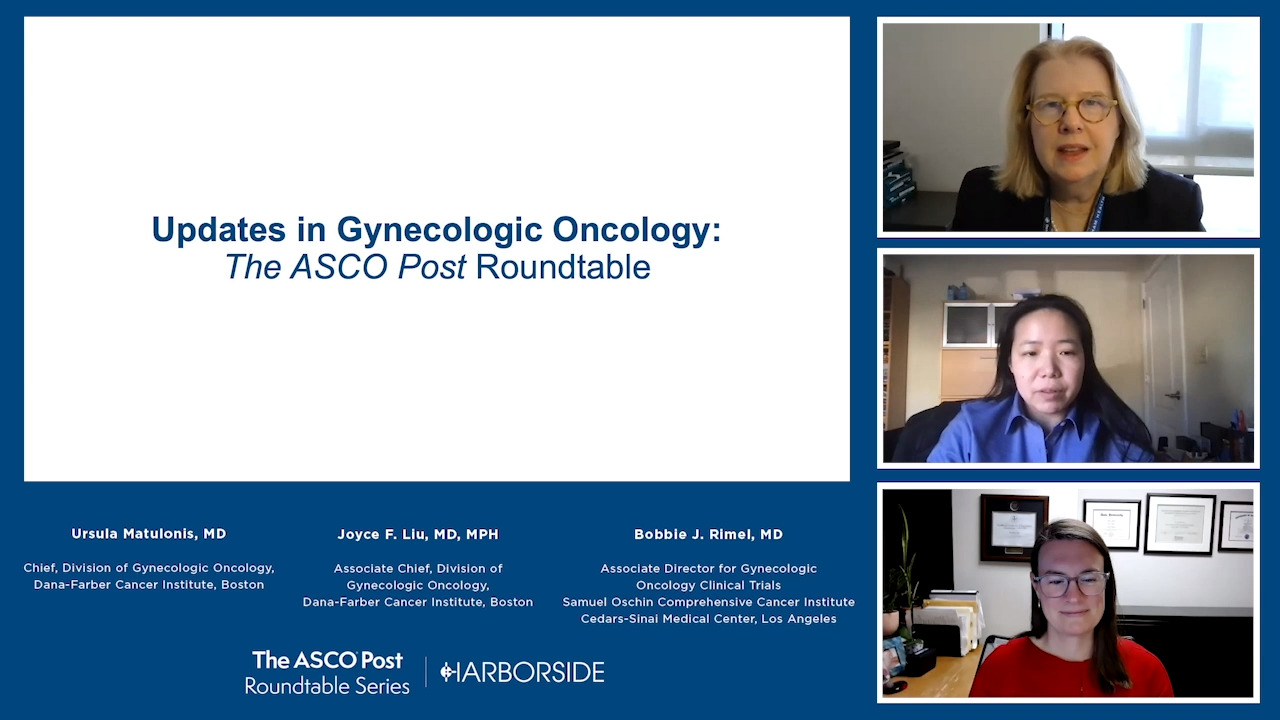Expert Point of View: Thomas Herzog, MD
Discussant of this phase II study, Thomas Herzog, MD, Deputy Director of the University of Cincinnati Cancer Center and Professor of Obstetrics and Gynecology at the UC College of Medicine, called the results “very exciting.” “The 33% response rate with the combination of ixabepilone plus...
Study Finds Ixabepilone Plus Bevacizumab Active in Platinum-Resistant or Recurrent Ovarian Cancer
The addition of bevacizumab to ixabepilone could be a promising treatment strategy for a group of patients with cancer currently lacking therapeutic options, according to data presented during the virtual edition of the Society of Gynecologic Oncology (SGO) 2021 Annual Meeting on Women’s Cancer.1...
FDA Pipeline: Priority Reviews in Kidney and Endometrial Cancers, Cholangiocarcinoma
Recently, the U.S. Food and Drug Administration (FDA) has granted Priority Review to the combination of pembrolizumab and lenvatinib for the treatment of both advanced renal cell carcinoma (RCC) and endometrial carcinoma. The FDA also granted Priority Review to ivosidenib for the treatment of...
Expert Point of View: Ursula Matulonis, MD, and Konstantin Zakashansky, MD
Perspectives on ARIEL4 were provided for The ASCO Post by the invited discussant Ursula Matulonis, MD, Professor of Medicine, Harvard Medical School, and Chief of Gynecologic Oncology and the Brock Wilson Family Chair at Dana-Farber Cancer Institute, Boston, and by Konstantin Zakashansky, MD,...
Phase III ARIEL4 Confirms Rucaparib’s Benefit in BRCA-Mutated Relapsed Ovarian Cancer
In patients with BRCA-mutated, advanced, relapsed ovarian cancer, treatment with the PARP (poly [ADP-ribose] polymerase) inhibitor rucaparib led to a significant improvement in progression-free survival compared with standard-of-care chemotherapy, according to results of the international phase III ...
IMagyn050 Trial: Addition of Atezolizumab to Bevacizumab and Chemotherapy for Newly Diagnosed Stage III or IV Ovarian Cancer
As reported in the Journal of Clinical Oncology by Kathleen N. Moore, MD, and colleagues, the phase III IMagyn050/GOG 3015/ENGOT-OV39 trial has shown that the addition of atezolizumab to bevacizumab and chemotherapy did not significantly improve progression-free survival in patients with newly...
First-Line Single-Agent Carboplatin vs Carboplatin/Paclitaxel in Older Women With Ovarian Cancer
In a phase II trial reported in JAMA Oncology, Falandry et al found that single-agent carboplatin was associated with poorer survival vs a standard carboplatin/paclitaxel regimen as first-line treatment for stage III/IV ovarian cancer in women aged 70 or older with high geriatric vulnerability...
Patient-Centered Outcomes in the SOLO-1 Trial of Maintenance Olaparib for Advanced Ovarian Cancer
In an analysis of health-related quality of life and patient-centered outcomes in the phase III SOLO-1 trial reported in The Lancet Oncology, Friedlander et al found no clinically meaningful difference in health-related quality of life—and improved quality-adjusted progression-free survival and...
Mismatch Repair–Deficient/Microsatellite Instability–High Recurrent Endometrial Cancer
In this video, Ursula Matulonis, MD; Joyce F. Liu, MD, MPH; and Bobbie J. Rimel, MD, focus on a case of mismatch repair–deficient/microsatellite instability–high recurrent endometrial cancer. They discuss the range of treatment options for patients with mismatch repair–deficient cancer, including the potential utility of single-agent immune checkpoint inhibitors such as pembrolizumab.
Mismatch Repair–Proficient Recurrent Endometrial Cancer
Ursula Matulonis, MD; Joyce F. Liu, MD, MPH; and Bobbie J. Rimel, MD, discuss the appropriate management of an older patient with mismatch repair–proficient recurrent endometrioid endometrial cancer, highlighting the importance of histology when determining the best treatment option for patients such as these. They review data from the phase III KEYNOTE-775 study, presented recently at the SGO 2021 Annual Meeting on Women’s Cancer, which evaluated pembrolizumab and lenvatinib in advanced endometrial cancer, and discuss the clinical implications of the findings.
Platinum-Sensitive Recurrent Ovarian Cancer
Ursula Matulonis, MD; Joyce F. Liu, MD, MPH; and Bobbie J. Rimel, MD, discuss a case of a woman with platinum-sensitive recurrent ovarian cancer who was found to have a germline BRCA1 mutation. They address the question of how to choose the optimal chemotherapy regimen for patients who are platinum-sensitive, whether maintenance bevacizumab or poly (ADP-ribose) polymerase inhibitors are appropriate, and how to manage adverse events. Recent data from SOLO-2 and ENGOT-OV16/NOVA are discussed.
Newly Diagnosed Advanced BRCA-Mutated Ovarian Cancer
In this video, Ursula Matulonis, MD; Joyce F. Liu, MD, MPH; and Bobbie J. Rimel, MD, discuss the use of poly (ADP-ribose) polymerase (PARP) inhibitors in the management of a patient with newly diagnosed, advanced ovarian cancer with a germline BRCA1 mutation. They review recent findings from the SOLO-1, PRIMA, and PAOLA-1 trials and provide insights into the management of adverse events that may arise from maintenance therapy with PARP inhibitors such as niraparib and olaparib.
Expert Point of View: Angeles Alvarez Secord, MD
The invited discussant of the phase II feMMe trial1 was Angeles Alvarez Secord, MD, Professor of Obstetrics and Gynecology, Duke University School of Medicine, Durham, North Carolina. She noted that, because of its “alarming” increase in incidence and mortality, endometrial cancer is “a critically...
Hormonal Intrauterine Device Under Study for Managing Early Endometrial Cancer
Disease regression was observed in 82% of women with endometrial hyperplasia with atypia and 43% of women with endometrial cancer after treatment for 6 months with a hormonal intrauterine device in a phase II study reported during the virtual edition of the Society of Gynecologic Oncology (SGO)...
Transmission of Cancer to Infants From Mothers With Cervical Cancer During Vaginal Delivery
In a brief report in The New England Journal of Medicine, Ayumu Arakawa, MD, of the Department of Pediatric Oncology, National Cancer Center Hospital, Tokyo, and colleagues described identification of lung cancer in two boys that likely resulted from transmission of maternal cervical cancer tumor...
Increasing Cervical Cancer Prevention and Care in Nepal
A new JCO Global Oncology special article details the process and results of a Multidisciplinary Cervical Cancer Prevention Course that ASCO volunteers led in Nepal, where cervical cancer remains the most common cancer among women and most patients present with an advanced stage of the disease.1...
Can Brachytherapy for Cervical Cancer Continue After Uterine Perforation?
A study published by Small et al in the journal Brachytherapy found that the common procedure of interstitial or intracavitary radiotherapy may continue safely—potentially without delay or antibiotics—in patients with cervical cancer following uterine perforation. According to the World Health...
FDA Grants Accelerated Approval to Dostarlimab-gxly for dMMR Endometrial Cancer
On April 22, the U.S. Food and Drug Administration (FDA) granted accelerated approval to dostarlimab-gxly (Jemperli) for adult patients with mismatch repair–deficient (dMMR) recurrent or advanced endometrial cancer, as determined by an FDA-approved test, that has progressed on or following a prior...
Tisotumab Vedotin in Recurrent or Metastatic Cervical Cancer
In a phase II study (innovaTV 204/GOG-3023/ENGOT-cx6) reported in The Lancet Oncology, Robert L. Coleman, MD, and colleagues found that the tissue factor–directed antibody-drug conjugate tisotumab vedotin produced durable responses in previously treated patients with recurrent or metastatic...
FDA Pipeline: Recent Designations in Urothelial Cancer, Cervical Cancer, Cholangiocarcinoma, and More
Recently, the U.S. Food and Drug Administration (FDA) issued regulatory decisions related to treatments for urothelial cancer, cervical cancer, cholangiocarcinoma, solid tumors, and colorectal cancer. Acceptance of Two Supplemental Biologics License Applications for Enfortumab Vedotin-ejfv in...
5-Year Follow-up of SOLO-1: Sustained Benefit for Maintenance Olaparib in Ovarian Cancer
In the 5-year follow-up of the pivotal SOLO-1 trial in women with newly diagnosed advanced ovarian cancer and a BRCA1/2 mutation, maintenance treatment with olaparib led to a more than doubling in progression-free survival, according to a presentation at the Society of Gynecologic Oncology (SGO)...
Outcomes With MRI-Based Image-Guided Adaptive Brachytherapy for Locally Advanced Cervical Cancer
In an international prospective cohort study (EMBRACE-I) reported in The Lancet Oncology, Pötter et al found that magnetic resonance imaging (MRI)-based image-guided adaptive brachytherapy was associated with a high rate of long-term local disease control and relatively low cumulative severe...
Genome-Wide Association Study of Variants Linked to Cervical Preinvasive and Invasive Disease
In a genome-wide association study reported in The Lancet Oncology, Bowden et al identified six independent variants among the PAX8, CLPTM1L, and HLA genes that were associated with risk for invasive cervical cancer or cervical intraepithelial neoplasia grade 3 (CIN3). As stated by the...
Patients With Ovarian Cancer Face an Increased Risk of Mental Illness
Women diagnosed with ovarian cancer were more than three times more likely than the general public to be diagnosed with anxiety, depression, and adjustment disorder, according to results presented by Hu et al during the virtual American Association for Cancer Research (AACR) Annual Meeting 2021...
Expert Point of View: Ursula Matulonis, MD
Invited discussant, Ursula Matulonis, MD, Chief of the Division of Gynecologic Oncology at Dana-Farber Cancer Institute, Boston, applauded the improved outcomes favoring lenvatinib/pembrolizumab in the confirmatory KEYNOTE-775 trial. “This represents the start of a new era in endometrial cancer...
Lenvatinib/Pembrolizumab Improves Survival in Advanced Endometrial Cancer
In the first report from the pivotal phase III KEYNOTE-775/Study 309 trial, the combination of lenvatinib, a multikinase inhibitor of VEGFR1, VEGFR2, and VEGFR3 kinases, and pembrolizumab significantly improved multiple outcomes compared with standard single-agent chemotherapy in patients with...
End-of-Life Care Remains Aggressive for Patients With Ovarian Cancer
Patients with ovarian cancer frequently receive aggressive end-of-life care despite industry guidelines that emphasize quality of life for those with advanced disease, according to a recent study published by Mullins et al in the journal Cancer. In fact, by 2016, intensive care unit (ICU) stays and ...
Image-Guided Percutaneous Thermal Ablation for Advanced Gynecologic Cancers
A study published by Yuan et al in the Journal of Vascular and Interventional Radiology found using percutaneous image-guided needle-based thermal ablation—the precise application of extreme heat or cold to a tumor using sophisticated imaging in a single outpatient session—is a safe and effective...
Overall Survival With Olaparib vs Placebo Maintenance in Patients With Platinum-Sensitive Relapsed Ovarian Cancer and BRCA1/2 Mutation
As reported in The Lancet Oncology by Andrés Poveda, MD, and colleagues, the phase III SOLO2/ENGOT-Ov21 trial has shown a large numeric but statistically nonsignificant improvement in the secondary endpoint of overall survival with olaparib tablet maintenance therapy vs placebo in patients with...
Anthony B. Costales, MD, on Advanced Ovarian Cancer: Predicting the Benefits of Minimally Invasive Surgery
Anthony B. Costales, MD, of the Baylor College of Medicine, discusses results from the MIID-SOC trial, which explored the question of whether laparoscopic surgery for removal of ovarian, fallopian tube, or primary peritoneal cancer following neoadjuvant chemotherapy is feasible, safe, and provides similar outcomes as open surgery.
Studies Presented at SGO Annual Meeting Examine Racial Health-Care Disparities in Patients With Gynecologic Cancers
Two studies presented at the Society of Gynecologic Oncology (SGO) 2021 Annual Meeting on Women’s Cancer highlighted the importance of addressing racial inequities in gynecologic cancers, including improving minorities’ low participation rates in clinical trials of women’s cancers. Clinical Trial...
WEE1 Inhibition in Patients With Recurrent Uterine Serous Carcinoma
In a single-institution phase II trial reported in the Journal of Clinical Oncology, Joyce F. Liu, MD, MPH, and colleagues found that the WEE1 inhibitor adavosertib produced durable responses in women with recurrent uterine serous carcinoma. The investigators stated, “Uterine serous carcinoma is a...
Andreas Obermair, MD, on Treating Endometrial Adenocarcinoma With a Levonorgestrel Intrauterine Device
Andreas Obermair, MD, of the University of Queensland and Queensland Centre for Gynaecological Cancer Research, discusses data on a hormonal IUD used to treat women with the precursor lesion endometrial hyperplasia with atypia (EHA) and those with stage I endometrial adenocarcinoma (EAC). At 6 months, the data showed a complete pathologic response in 82% of patients with EHA and in 43% of those with EAC (ID# 10244).
Amir A. Jazaeri, MD, on Metastatic Cervical Cancer: The Role of Immunotherapy
Amir A. Jazaeri, MD, of The University of Texas MD Anderson Cancer Center, discusses data on the safety and efficacy of adoptive cell transfer using autologous tumor-infiltrating lymphocytes (LN-145) to treat patients with recurrent, metastatic, or persistent cervical carcinoma whose tumors have progressed on prior systemic therapy (ID # 10224).
Eric Pujade-Lauraine, MD, PhD, on First-Line Maintenance Therapy in Ovarian Cancer
Eric Pujade-Lauraine, MD, PhD, of Hôpital Hôtel-Dieu, discusses results from the PAOLA-1ENGOT-ov25 trial on the use of homologous recombination–repair mutation gene panels and whether they can predict the efficacy of olaparib plus bevacizumab in first-line maintenance therapy for patients with ovarian cancer (ID# 10224).
Brittany A. Davidson, MD, on a Model to Predict the Need for Opioids After Gynecologic Surgery
Brittany A. Davidson, MD, of Duke University, discusses the development and validation of the GO-POP model (Gynecologic Oncology Predictor of Postoperative opioid use), an individualized patient-centered predictive tool designed to help avoid overprescribing pain medications (ID# 10253).
Dana M. Roque, MD, on Ovarian, Fallopian Tube, and Peritoneal Cancers: Possible New Therapeutic Option for Heavily Pretreated Disease
Dana M. Roque, MD, of the University of Maryland Medical Center, discusses phase II results showing that weekly ixabepilone plus biweekly bevacizumab may improve overall response rate as well as progression-free and overall survival for women with platinum-resistant or -refractory ovarian, fallopian tube, and primary peritoneal cancers, a population in need of treatment choices.
Laura Chambers, DO, on Treating Epithelial Ovarian Cancer With Cisplatin and Paclitaxel During Surgery
Laura Chambers, DO, of the Cleveland Clinic, discusses data showing that combining paclitaxel and cisplatin vs cisplatin alone with hyperthermic intraperitoneal chemotherapy at interval debulking surgery improved progression-free survival. There was no difference in postoperative complications, length of stay, or time to chemotherapy, but admission to intensive care units did increase.
Supriya Chopra, MD, on Cervical Cancer: Reducing Late Effects of Bowel Toxicity
Supriya Chopra, MD, of Tata Memorial Centre, discusses a final analysis of the phase III PARCER trial, which showed that image-guided intensity-modulated radiotherapy is superior to conventional radiotherapy in reducing bowel toxicity in women with cervical cancer. Acute diarrhea was also reduced, with no difference in disease-related outcomes (ID# 10224).
Lauren Thomaier, MD, on Predicting Chemotherapy-Induced Peripheral Neuropathy in Gynecologic Cancer Survivors
Lauren Thomaier, MD, of the University of Minnesota, discusses the genetic variants found to be associated with an increase in chemotherapy-induced neuropathy symptoms in a cohort of gynecologic cancer survivors. Combining these variants with clinical characteristics may provide an important treatment tool (ID# 10253).
Emily Hinchcliff, MD, MPH, on Treating Non–Clear Cell Ovarian Cancer With Durvalumab and Tremelimumab
Emily Hinchcliff, MD, MPH, of The University of Texas MD Anderson Cancer Center, discusses phase II results of durvalumab (anti–PD-L1) and tremelimumab (anti–CTLA-4) administered in combination vs sequentially for the treatment of recurrent platinum-resistant non–clear cell ovarian cancer (ID #10240).
Sandro Pignata, MD, PhD, on BRCA-Mutated Ovarian Cancer: Maintenance Olaparib Outcomes
Sandro Pignata, MD, PhD, of the Istituto Nazionale dei Tumori, discusses results from the ORZORA trial, which showed the efficacy of olaparib in patients with platinum-sensitive relapsed ovarian cancer is similar, whether they have a germline or somatic BRCA mutation. This information could prove useful for clinical practice (ID #10226).
Alice P. Barr, MD, on Advanced Ovarian Cancer: Minimally Invasive vs Open Surgery After Chemotherapy
Alice P. Barr, MD, of the Carolinas Medical Center and Levine Cancer Institute, discusses results from a retrospective study, which showed that progression-free and overall survival appeared to be no different with open surgery and minimally invasive surgery for interval debulking after neoadjuvant chemotherapy in women with advanced epithelial ovarian cancer. Perioperative outcomes also seemed to be superior with minimally invasive surgery (ID #10209).
Image-Guided Intensity-Modulated Radiotherapy in Patients With Cervical Cancer
Treatment with image-guided intensity-modulated radiotherapy (IG-IMRT) led to reduced late toxicities vs standard three-dimensional (3D) conformal radiotherapy in patients with cervical cancer, according to data presented by Supriya Chopra, MD, and colleagues during the Society of Gynecologic...
Niraparib Plus Bevacizumab Shows Clinical Benefit in Patients With Advanced Ovarian Cancer
The addition of niraparib maintenance to first-line platinum-based chemotherapy with bevacizumab demonstrated clinical benefit in patients with advanced ovarian cancer, according to data from the OVARIO study presented by Melissa M. Hardesty, MD, MPH, during the Society of Gynecologic Oncology...
Charles N. Landen, MD, on Newly Diagnosed Ovarian Cancer: BRCA Mutations, PD-L1 Expression, and Combination Chemoimmunotherapy
Charles N. Landen, MD, of the University of Virginia, discusses results from the first clinical trial in ovarian cancer to demonstrate that neither a BRCA1/2 mutation nor a homologous recombination deficiency improves sensitivity to a therapeutic PD-L1 blockade in patients receiving atezolizumab vs placebo combined with carboplatin, paclitaxel, and bevacizumab for newly diagnosed disease (ID #10240).
Hyun C. Chung, MD, on Pembrolizumab for Advanced Cervical Cancer: Update From KEYNOTE-158
Hyun C. Chung, MD, of Yonsei Cancer Center and Yonsei University College of Medicine, discusses phase II findings from the KEYNOTE-158 study, which support the use of pembrolizumab for patients with recurrent or metastatic cervical cancer that has progressed on or after chemotherapy and whose tumors express PD-L1.
Hormonal IUD May Be a Potential Nonsurgical Treatment for Early Endometrial Cancer or Precancer
An intrauterine device, or IUD, that releases the hormone levonorgestrel appears to be an effective treatment for endometrial precancer and early-stage endometrial cancer, according to new study results presented by Andreas Obermair, MD, at the Society of Gynecologic Oncology (SGO) 2021 Virtual...
Shannon N. Westin, MD, on Treating Endometrial Cancer With Enzalutamide, Paclitaxel, and Carboplatin
Shannon N. Westin, MD, of The University of Texas MD Anderson Cancer Center, discusses phase II results from the ENPAC trial, which showed the combination of enzalutamide, paclitaxel, and carboplatin yielded promising clinical outcomes in chemotherapy-naive advanced or recurrent endometrioid cancer (ID # 10244).
Maintenance Olaparib Yields Strong and Sustained Benefit in Ovarian Cancer
In the 5-year follow-up of the pivotal SOLO-1 trial in women with advanced ovarian cancer and a BRCA1/2 mutation, maintenance treatment with olaparib led to a doubling in progression-free survival. William H. Bradley, MD, presented these findings at the Society of Gynecologic Oncology (SGO) 2021...



















